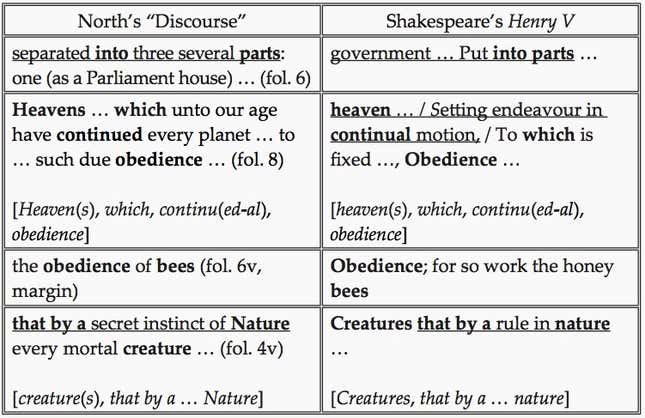Software used to catch cheating college students has a new use: As a tool to study one of the world’s most famous playwrights.
William Shakespeare is well known to have been something of a magpie when it came to plots and characters—borrowing (and elevating) stories and turns of phrase from writers ranging from Giovanni Boccaccio to Christopher Marlowe. Next week an academic book comes out about a newly discovered source of inspiration for William Shakespeare. Edited by Dennis McCarthy and June Schlueter, “A Brief Discourse of Rebellion and Rebels” by George North: A Newly Uncovered Manuscript Source for Shakespeare’s Plays will be released Feb. 16 from D.S. Brewer, an imprint of Boydell & Brewer.
Part of the researchers’ process to verify the connection between Shakespeare’s plays and an obscure 16th-century manuscript—of which there previously had been only one copy in the world—was to feed the Shakespearean canon into an open-source tool called WCopyfind, built to catch plagiarism by college students. The scholars’ searches yielded 20 matching passages between the two, including similarities to Richard III, Macbeth, Henry V, and King Lear.
Despite centuries of study and performances of Shakespeare’s works, the book shows there’s still more to learn about the 16th-century English writer, who has always been an enigmatic figure. “It shows that there are still manuscript sources out there that have not been published that Shakespeare may have used, and it shows that we don’t know everything about the origins of the Shakespeare canon,” says McCarthy, an independent scholar who’s been researching the connection to North since 2006. “We know a lot, but we don’t know everything. There are still some surprises in store.”
McCarthy says North was a “middling writer” and that his essay was a standard exaltation of the aristocracy of the time and a condemnation of rebellions. He insists that this finding doesn’t bolster the theory that Shakespeare didn’t exist or the idea that he was a rampant plagiarist.
One comparison noted in the book is an extended metaphor about the natural order of the world, as demonstrated by obedient bees. Here are a few commonalities between the North manuscript and the first act of Henry V:

As McCarthy notes, it’s not only the similar language but the matching context that indicate North’s manuscript was a source text for the play.
The book is also edited by Schlueter, a prominent Shakespearean and professor emerita of Lafayette College, and was reviewed by two major scholars of Shakespeare before it was published. McCarthy attempts to show in the book that the probability that similar words would come up in completely unrelated texts is minuscule, and tells Quartz he believes it’s very unlikely that Shakespeare and North were both inspired by a third text that has yet to be discovered.
